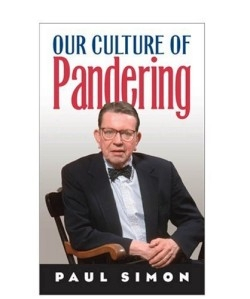
Our Culture of Pandering
There are a couple of ways a politician might convince voters that he’s their guy. He can demonstrate strong leadership, or he can pander. Unfortunately, says the author, former U.S. Senator from Illinois, most of today’s politicians choose to pander-to give us what is easy instead of fighting for what is right. It seems that the siren call of poll numbers, which sing the whim of public opinion, is irresistible.
The author or coauthor of nineteen books, including Freedom’s Champion: Elijah Lovejoy and Tapped Out: The Coming World Crisis in Water, Simon is now a director of the Public Policy Institute at the University of Southern Illinois. In this book, which should be required reading for all the presidential candidates including the incumbent, he clearly and pointedly discusses several issues-taxes, social security, civil liberties, crime-that invite pandering. The polls say that the voters don’t like taxes, so weak-kneed politicians avoid any explanation of how and why the public actually benefits from taxes. Similarly, on the hustings a pledge to be tough on crime is an easy applause line, while long-term solutions sound dull and unexciting.
Extending his exposé beyond politicians to the culture at large, Simon critiques pandering in the media, religion, and education. The media, with its pursuit of public titillation and maximum profit, aims low every time. Media spokespersons argue that they are merely giving the public what it wants, but Simon calls that a lame defense, suggesting that targeting popular, lowest-common-denominator tastes is short-sighted and ultimately hurts the integrity of the media itself.
In the area of religion, Americans are stunningly arrogant and pious. They believe themselves to be good, generous people, and politicians and religious leaders pander to that belief. Recently, George W. Bush claimed that the U.S. provides more aid to the world’s poor than any other nation. Not only is that false in absolute dollars (Japan and France contribute more), but the U.S. is in last place among the twenty-two wealthiest nations in terms of the percentage of national income that goes to help the poor beyond our borders.
As for education, U.S. students spend far fewer days in the classroom than students in most other countries. Every study shows that the more time spent in school, the better the results. Simon says the biggest barriers to changing the school year are politicians and educators who fear offending parents, teachers, and taxpayers.
Simon concludes with sensible suggestions for specific action. He acknowledges that his recommendations may seem obvious, but says that too often the obvious is not taking place. Most importantly, every action will require courage, a quality seldom found in a panderer.
Reviewed by
Rob Mitchell
Disclosure: This article is not an endorsement, but a review. The publisher of this book provided free copies of the book to have their book reviewed by a professional reviewer. No fee was paid by the publisher for this review. Foreword Reviews only recommends books that we love. Foreword Magazine, Inc. is disclosing this in accordance with the Federal Trade Commission’s 16 CFR, Part 255.
